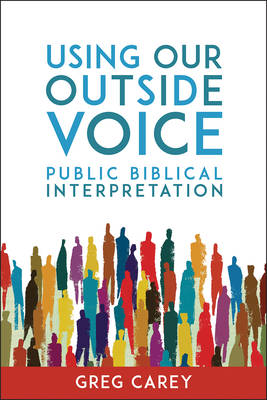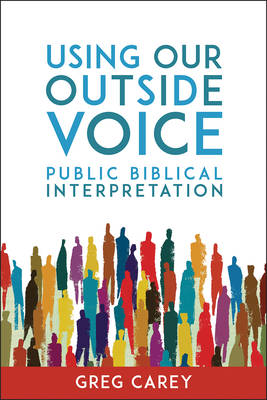
- Afhalen na 1 uur in een winkel met voorraad
- Gratis thuislevering in België vanaf € 30
- Ruim aanbod met 7 miljoen producten
- Afhalen na 1 uur in een winkel met voorraad
- Gratis thuislevering in België vanaf € 30
- Ruim aanbod met 7 miljoen producten
Omschrijving
In Using Our Outside Voice, Greg Carey contends that responsible public biblical interpretation requires the ability to enter a conversation about the Bible, to understand the various arguments in play, and to offer informed opinions that others can understand. This role demands not only basic knowledge but also identifiable skills, habits, and dispositions. Carey does not suggest that public interpreters of the Bible are more insightful or more correct than are other people. But public biblical interpretation involves participating in reasoned conversations about the Bible and its significance.
People appeal to the Bible for all sorts of reasons. The work of public biblical interpretation involves a level of accountability, both scholarly and moral. Carey encourages interpreters to develop proficiency in historical, cultural, and literary modes of interpretation as well as to cultivate familiarity with a broad range of interpretive options, including those from diverse cultural locations and historical points of view. Many interpreters work within the context of particular faith traditions and are accountable for engaging those traditions in meaningful, constructive ways. Public interpreters also are accountable for the ethical implications of their work.
Using Our Outside Voice is ideal for students in biblical studies and those who teach, preach, and interpret the Bible.
Specificaties
Betrokkenen
- Auteur(s):
- Uitgeverij:
Inhoud
- Aantal bladzijden:
- 192
- Taal:
- Engels
Eigenschappen
- Productcode (EAN):
- 9781451496338
- Verschijningsdatum:
- 5/05/2020
- Uitvoering:
- Paperback
- Formaat:
- Trade paperback (VS)
- Afmetingen:
- 147 mm x 221 mm
- Gewicht:
- 430 g

Alleen bij Standaard Boekhandel
Beoordelingen
We publiceren alleen reviews die voldoen aan de voorwaarden voor reviews. Bekijk onze voorwaarden voor reviews.











